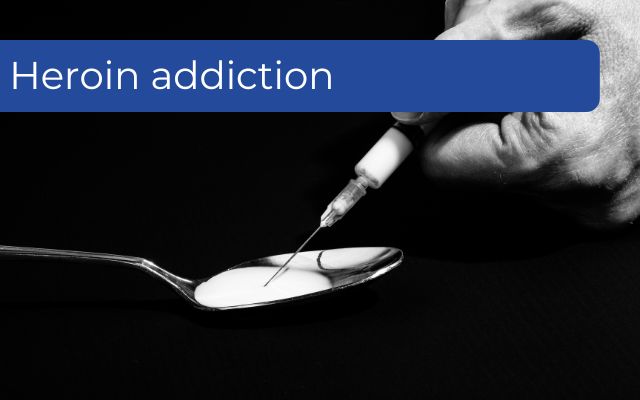
Heroin addiction, an overview
Heroin is an illicit and powerful drug that comes from the pod of the opium poppy which is grown and harvested in parts of Asia, India, the Middle East, parts of South America, Afghanistan, Columbia, and Mexico, and more often than not the use of this substance is more than just recreational, many users develop a sometimes deadly heroin addiction. Heroin appears in the form of white powder (purest form), brown or black powder (with additives and commonly used), and black sticky gel known as black tar. Heroin can be smoked, snorted, or injected.
How does it affect the user?
Heroin is a strong opiate that works quickly and attaches to opioid receptors in the brain. The brains reward system becomes flooded and chemicals like dopamine and endorphins are released. Heroin users typically describe feeling a surge of pleasure, referred to as a rush.
The addiction to heroin can take hold quite quickly due to its rapid effect on the brain and eventually the user cannot feel normal or function without the drug. The brain loses its natural ability to produce dopamine on its own and the user then increases their dose to get the same effect. This effect of using more to achieve the same effect is called tolerance and increases the chance of an overdose.
Overdose
When people overdose on heroin, their breathing often slows or stops. This decreases the amount of oxygen that reaches the brain, a condition called hypoxia. Hypoxia can have short and long-term mental effects and effects on the nervous system, potentially including coma and permanent brain damage.
Signs of a heroin overdose include:
- Constricted pupils
- Shallow breathing
- Dry mouth
- Tongue discoloration
- Slow pulse
- Blue lips
- Disorientation
- Weak pulse
Heroin is very addictive and will not take many times to develop a full-blown substance use disorder – a chronic, relapsing, brain disease that goes beyond physical dependence and is characterized by uncontrollable physical craving and mental obsession that results in drug-seeking behaviour with little regard for the consequences.
Although injecting heroin into the system may reach the brain faster than through other methods, heroin is extremely addictive no matter how it is administered. People who inject heroin are, however, at higher risk of contracting blood-borne diseases like HIV and/or Hepatitis A, B or C (HCV) virus. These diseases are transmitted through blood contact or other bodily fluids, which can occur when sharing needles.
Effects of using heroin include the following:
| Short-term effects | Long-term effects |
| ⦁ Dry mouth ⦁ Warm flushing ⦁ Nausea and vomiting ⦁ Severe itching ⦁ Heavy feeling in the arms and legs ⦁ Clouded mental functioning ⦁ Between states of being conscious / semi-consciousness | ⦁ Insomnia ⦁ Infection of the heart lining and valves ⦁ Abscesses (swollen tissue filled with pus) ⦁ Constipation and stomach cramping ⦁ Liver and kidney disease ⦁ Lung complications, including pneumonia ⦁ Depression ⦁ Sexual dysfunction for men ⦁ Irregular menstrual cycles for women |
Withdrawal
When a user attempts to stop using heroin the withdrawal may start within a few hours of the last “hit” or use of the drug.
Symptoms of withdrawal include:
- Restlessness
- Muscle and bone pain
- Insomnia
- Diarrhea
- Vomiting
- Cold spells with goosebumps
- Involuntary leg movements
The worst of the peak of the withdrawal is between 24 and 48 hours after the last dose. Physical withdrawals begin to subside within approximately a week however some people have shown persistent withdrawal signs over months.
Treatment
Addiction is a chronic disease that requires specialized treatment within a rehab facility. Heroin addiction may require long-term treatment combining medicinal and behavioural therapies in order to restore a semblance of normalcy to the person’s brain process and function.
“I understood myself only after I destroyed myself. And only in the process of fixing myself, did I know who I really was” – Sade Andria Zabala
There is always help and there is always hope and help available. Changes Rehab Johannesburg is here to guide and support you through each step.
Call 081-444-7000 or email [email protected] to get the help you need today.
Heroin Street names: Black, Black Tar, Black Pearl, Black Stuff, Black Eagle, Boy, Brown, Brown Crystal, Brown Rhine, Brown Sugar, Brown Tape, China White, Dope, Dope, Dragon, The Dragon, H, He, Horse, Junk, Mexican Brown, Mexican Mud, Mexican Horse, Mud, Number 3, Number 4, Number 8, Sack, Scat, Skag, Skunk, Smack, Snow, Snowball, Tar, White, White Nurse, White Lady, White Horse, White Girl, White Boy, White Stuff